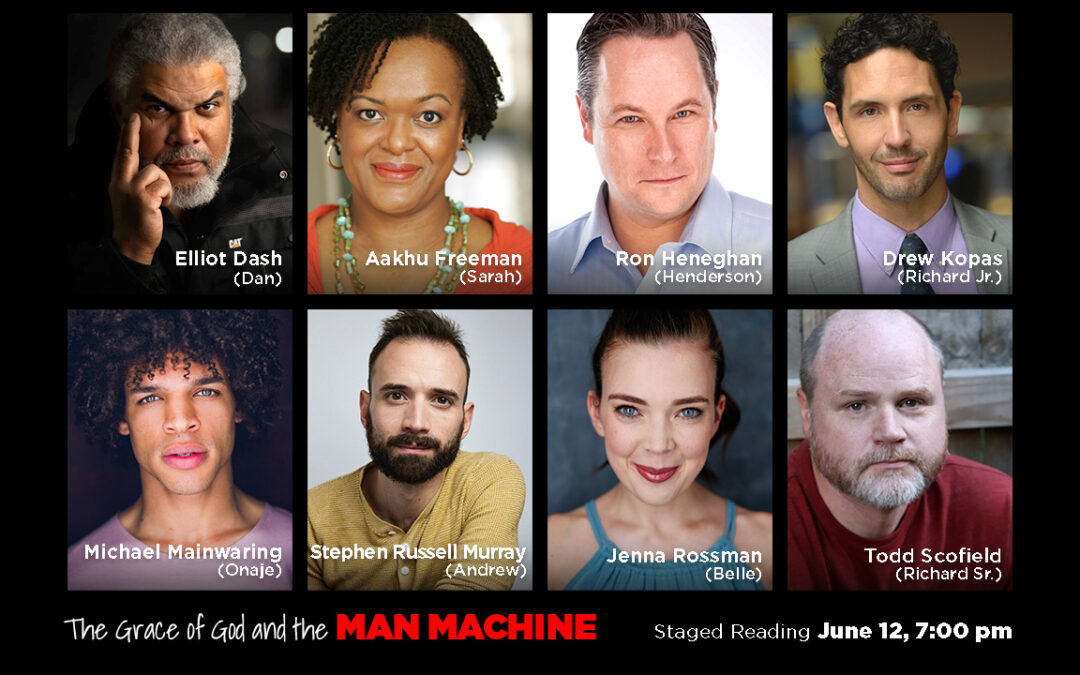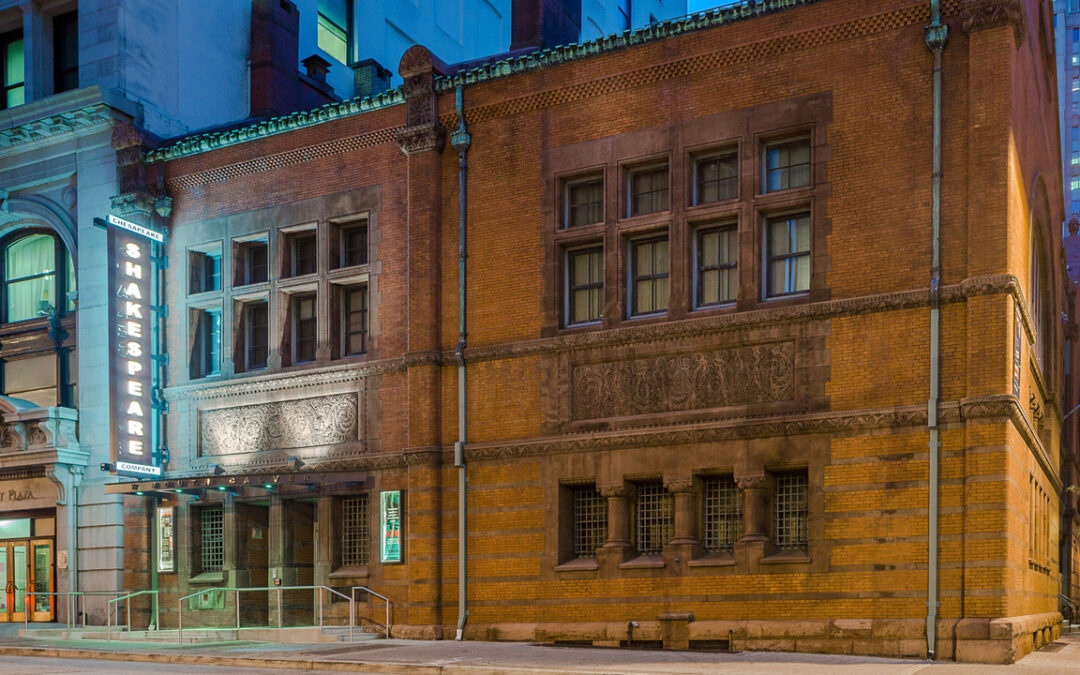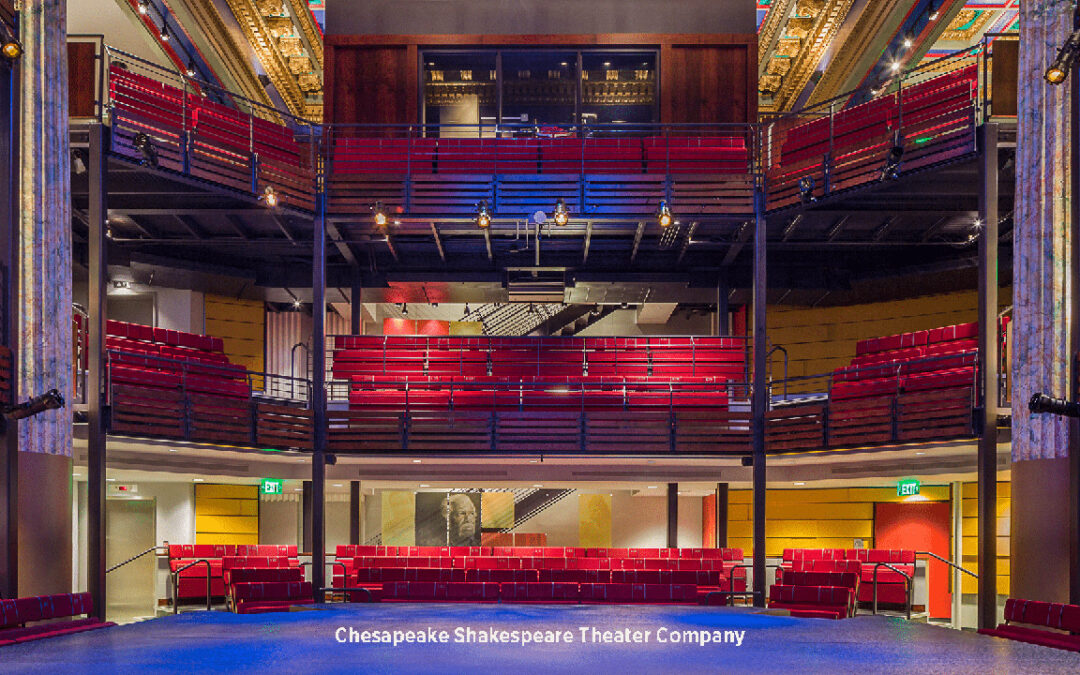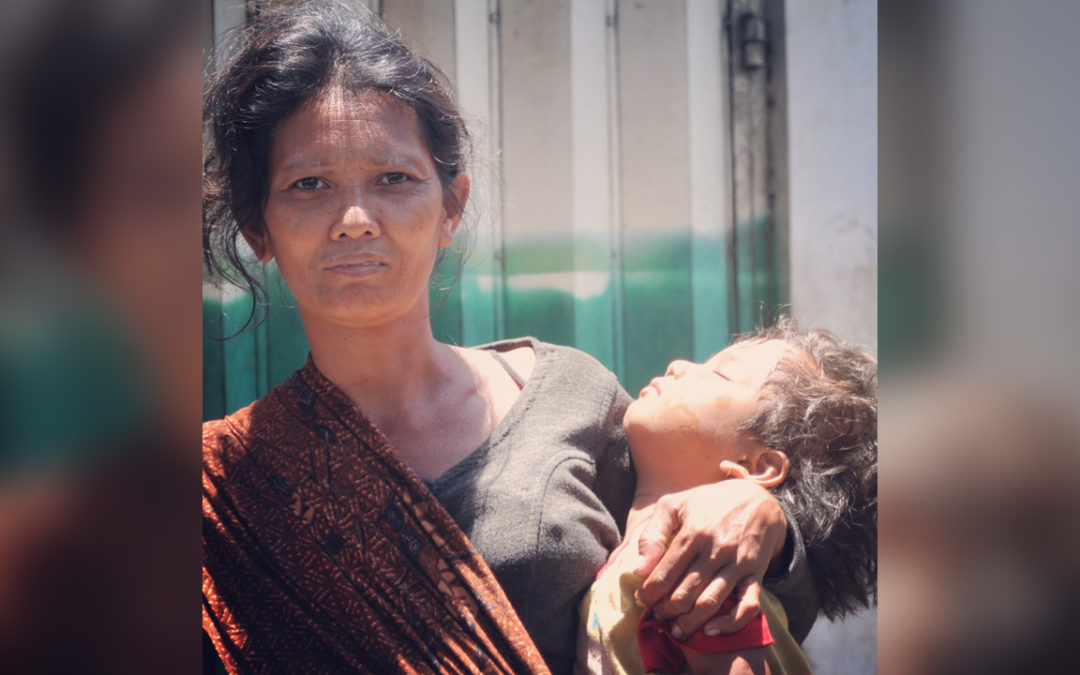
by Robert Bowie, Jr. | Jun 12, 2023 | Featured, Man Machine, Plays
It’s TONIGHT, Monday night. Join us! Please use this link to RSVP:
https://robertbowiejr.com/rsvp
Our one-night-only staged reading at Chesapeake Shakespeare Studio Theatre in Baltimore is THIS MONDAY, June 12, at 7:00 pm.
Directed by Stephen Eich, former Managing Director of Chicago’s Steppenwolf Theatre, and starring a fantastic ensemble of talented actors, this staged reading of The Grace of God and the Man Machine promises to be an exceptional night of live theater you don’t want to miss.
And it’s free!
We’re encouraging theater owners and artistic directors in the Baltimore/DC area to come experience the play, and would love to have you there in the audience.
Chesapeake Shakespeare Studio Theatre
206 E. Redwood St.
Baltimore, MD 20212 (map).
Parking one block away at:
Arrow Parking, 204 E. Lombard St., Baltimore, MD (map).
Doors open at 6:30, performance begins at 7:00.
Please CLICK HERE to RSVP: https://robertbowiejr.com/rsvp
Be there or be square!

by Robert Bowie, Jr. | Jun 6, 2023 | Featured, Man Machine, Plays
Meet our cast of characters:
Dan, a Chesapeake Bay oysterman, his wife Sarah, Henderson, an ex-cop, Richard Jr., a cowboy driving a convertible, Onaje, a hitchhiker navigating with a sextant, Andrew, a civil rights worker, Belle, a truck stop waitress, and Richard Sr., a Chesapeake Bay oysterman.
Meet our amazing cast:
Our staged reading at Chesapeake Shakespeare Company is coming up, Monday, June 12, 7:00 pm. Thanks to our casting director, Barbara Pinolini, we are thrilled to have assembled an incredible array of talented professional actors from the Baltimore/DC area: Elliot Dash (Dan), Aakhu Freeman (Sarah), Ron Heneghan (Henderson), Drew Kopas (Richard Jr.), Michael Mainwaring (Onaje), Stephen Russell Murray (Andrew), Jenna Rossman (Belle), Todd Scofield (Richard Sr.).
Meet our accomplished director:
Stephen Eich is a former Managing Director of Chicago’s Steppenwolf Theatre, where he produced over 125 productions including the 1993 TONY-nominated The Song of Jacob Zulu (featuring Ladysmith Black Mambazo), as well as the 1990 TONY-winning Best Play, The Grapes of Wrath. He also produced Steve Martin’s award-winning Picasso at the Lapin Agile at Steppenwolf, before taking it to Los Angeles, New York, San Francisco and England and the National Tour.
Join us this Monday night!
The performance is free. We’re looking for theater owners and artistic directors in the Baltimore/DC area to host future professional performances (and also supporters of live theater).
Chesapeake Shakespeare Studio Theatre
206 E. Redwood St.
Baltimore, MD 20212 (map).
Parking one block away at:
Arrow Parking, 204 E. Lombard St., Baltimore, MD (map).
Doors open at 6:15, performance begins at 7:00.
Please CLICK HERE to RSVP: https://robertbowiejr.com/rsvp
Hope to meet you there!

by Robert Bowie, Jr. | May 30, 2023 | Featured, Man Machine, Plays
As our staged reading of The Grace of God & The Man Machine gets ready for its performance we are getting more inquiries about the cost of admission.
It’s FREE!
We are actively courting the artistic directors of professional theaters in the Washington/Baltimore area and suburbs to find a home for The Grace of God & The Man Machine, and have invited them to come see the play at a staged reading, Monday, June 12 at the Chesapeake Shakespeare Studio Theatre in the Financial District of Baltimore.
Director Stephen Eich will take over the theater the morning on June 12th. He and Casting Director Barbara Pinolini have hand-picked some of the finest actors in the Washington/Baltimore area (more on them next week). Many of these actors will likely be meeting for the first time, coming together to create two families and a history of love and conflict from eight very complex, often humorous characters.
A little after noon, they will take a lunch break, then continue to rehearse the play until 5:30 or so to break for dinner.
Come watch this happen. It’s a highly emotional play with great humor and the actors are exhilarating. Come early before 7:00 pm. The cash bar will be open. Stay afterward for the talkback with Steve, Barbara, the actors, and myself. Feel the play. Be part of theater working. All for free.
Chesapeake Shakespeare Studio Theatre
206 E. Redwood St.
Baltimore, MD 20212 (map).
Parking one block away at:
Arrow Parking, 204 E. Lombard St., Baltimore, MD (map).
Doors open at 6:15, performance begins at 7:00.
Please CLICK HERE to RSVP: https://robertbowiejr.com/rsvp

by Robert Bowie, Jr. | May 23, 2023 | Featured, Man Machine, Personal
Last week, I wrote about the untimely death, due to Covid, of my play, The Grace of God & The Man Machine, just before its Off-Broadway debut, but I also wrote about its planned rebirth on Monday, June 12th at 7pm at the Chesapeake Shakespeare Studio Theatre in Baltimore’s financial district.
This week, I wanted to share the history of where the play came from over 50 years ago. (You have marked your calendar for Monday night, June 12th, right?)
In the summer of 1967, I was a teenage boy who travelled for the first time down south from my home in Massachusetts to the eastern shore of Maryland. Less than a month later, not far from Easton, where I was staying, the civil rights riots in Cambridge, Maryland exploded late that July, when H. Rap Brown, head of the Student Nonviolent Coordinating Committee, had been invited to lead a peaceful protest in support of the Civil Rights Act of 1964, which had not been recognized down in Cambridge.
Activist Gloria Richardson, who had invited Rap to speak, admitted later that he went beyond the assigned bounds, but also asserted that the black neighborhoods were set on fire in retaliation, and the white-operated fire trucks refused to put out the fires.
Shortly thereafter, Governor Spiro Agnew went down to Cambridge and chastised the black population for lighting their homes on fire. Agnew got national headlines and, as a result, Richard Nixon asked him to be his running mate in the upcoming presidential elections.
Within the first two days, I knew I was an outsider. The blacks in Easton would not make eye contact with a white boy whose hair was a little longer than the buzz cuts of his contemporaries in Easton. When I was invited to swim at the Easton Country Club, the lifeguard rushed over to stop me, saying if I wanted to swim there, I would have to wear a bathing cap.
I looked around. Not even the girls swimming in the pool were wearing bathing caps. I felt uneasy.
That afternoon, I tasted Chesapeake Bay blue crab for the first time at The Crab Claw restaurant overlooking the Bay. My host, a local doctor, snapped his fingers and used the N-word to call the waiter to bring more crabs and more beer as the afternoon progressed. I felt very uneasy. Similar experiences leading up to the riots that steamy July never left me.
I was forever changed by these experiences and this play came from the scars that were left more than 50 years ago.
Several months ago, after the Off-Broadway run was cancelled, I got an unexpected phone call from Steve Eich, telling me that he had read the play and he would like to talk.
Steven Eich is a remarkable figure in American theatre. Years ago, I had been fortunate to have bought a single ticket to see his Broadway production of The Grapes of Wrath, which had just received a Tony Award for Best Play.
- Steve has been Managing Director of the Steppenwolf Theatre in Chicago, 1979–1995.
- Managing Director of Geffen Playhouse in Los Angeles, 2000–2008.
- Executive Director of the Pasadena Playhouse, Pasadena, 2009–2012.
He has been an award-winning producer and director, whose credits include The Grapes of Wrath, Picasso at the Lapin Agile, Paul Simon’s The Capeman, The Trial of an American President, and Frank The Man, about Frank Sinatra.
Steve has been a great champion of the play, and wants to present it in the area where the events of the play took place. The goal of our June 12th reading is to find supporters and a venue for its future life. It’s going to be an exciting night, with a talkback afterward where you can meet Steve and the actors.
I would greatly appreciate it if you can help me spread the word. Feel free to like this post and share it, and I will see you there.
Chesapeake Shakespeare Studio Theatre
206 E. Redwood St.
Baltimore, MD 20212 (map).
Parking one block away at:
Arrow Parking, 204 E. Lombard St., Baltimore, MD (map).
Doors open at 6:15, performance begins at 7:00.
Please CLICK HERE to RSVP: https://robertbowiejr.com/rsvp

by Robert Bowie, Jr. | May 16, 2023 | Featured, Man Machine, Plays
Mark your calendar for Monday night, June 12!
Several months ago I was contacted by Stephen Eich. He told me that he had read my play, The Grace of God & The Man Machine, and he wanted to talk about it. This was an amazing surprise for several reasons:
First, Steven Eich is a remarkable figure in all aspects of American theatre. He has been Managing Director, Steppenwolf Theatre Chicago, 1979-1995. Managing Director, Geffen Playhouse, Los Angeles, 2000-2008, Executive Director, Pasadena
Playhouse, Pasadena, 2009-2012.
He has also been an award-winning producer and director. To name a few: The Grapes of Wrath, TONY AWARD BEST PLAY 1990, Producer; Picasso at the Lapin Agile, Producer, 1993–Present; Paul Simon’s The Capeman, Co-Producer 1996–1998; The Trial of an American President, NYC 2016, Director; Frank The Man, Music-Director/Producer.
Second, I was still mourning what I concluded was the end of life for this wonderful play after its off Broadway closing before it opened, after years of preparation and delays, because its producer went under due to Covid closures.
Over the last several months, Steve and I have gone over the play page by page, line by line, and finally we met last month in Baltimore so Steve could meet with Barbara Pinolini, the very well respected actress and casting Director from Washington DC with whom steve wanted to work to get his professional cast and to secure the theater he wanted for a staged reading in the Baltimore/Washington area. Since the play concerns the civil rights riots in the eastern shore of Maryland, in 1967 and its aftermath, Steve’s theory is because it happened in the Maryland/ D.C. Area this is where its professional rebirth should occur.
Please join us! Mark your calendar for Monday night, June 12. The performance is free. We’re looking for theater owners and artistic directors in the Baltimore/DC area to host future professional performances (and also supporters of live theater).
Chesapeake Shakespeare Studio Theatre
206 E. Redwood St.
Baltimore, MD 20212 (map).
Parking one block away at:
Arrow Parking, 204 E. Lombard St., Baltimore, MD (map).
Doors open at 6:15, performance begins at 7:00.
Please CLICK HERE to RSVP: https://robertbowiejr.com/rsvp

by Robert Bowie, Jr. | Feb 7, 2023 | Featured, Personal, Travel
Twelve or 13 years ago, in Indonesia, I saw a homeless woman resting in the shadows of a side street holding a sick child in her arms. She looked up indifferently at me as I passed through the shadows, but I saw her eyes.
They were part of a portrait of incurable poverty, not drugs or alcohol. I saw no family, no food, no resources and no hope.
It is a moment I can’t forget.
She was so beaten down. I could not tell her age. Her child was so young and quiet. Her eyes seemed vacant and without hope. It was a combination of abject poverty and also a renaissance portrait of Madonna and child.
Without thinking, I surprised myself. I reached into my pocket and handed her what I had. I have no idea how much money I gave to her. It was everything but it was a foreign currency.
I was instantly embarrassed at this unexpected burst of emotions, so I didn’t look back. I just kept walking.
I have come to conclude that no matter where we go, we live in our American culture, its vision of itself, and only caricatures of the outside world which have been baked into me and I take for granted. As Americans, we believe ourselves to be kind, but while it may be our nature to be kind, we protect ourselves from caricatures, like the poverty of strangers when it becomes too much.
When the caricatures fall apart, a different world takes its place.
She was not begging. I just found myself giving her a fistful of money and I kept walking. The money was balled up into my fist when I gave it to her.
I didn’t see her after I gave it to her.
When I turned away, I left the shadows and went into the sunlight and tried to leave it all behind. To forget about what I saw and what I had done. I was surprised to find that she had gotten up and followed me. She’d put her hand on my shoulder. Was she touching me to acknowledge the amount of money I had given her?
Yes I think so, but I think it was something more.
She pointed at my camera as if to say, “thank you and remember me.” She did not smile as I took her picture. She just looked at me with those eyes I can’t forget. I don’t need the photo but I return to it off and on.
I wonder if they are both gone now. It was a while ago. I still have that photograph. It is posted here. I want to remember her and never think of her as a caricatures of poverty.





